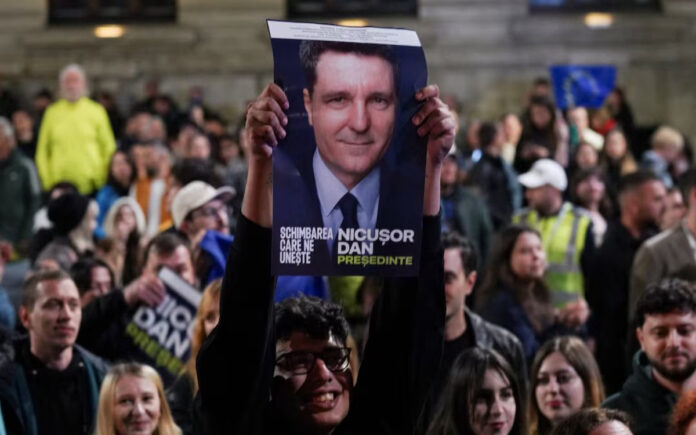Bucharest: Romania has elected centrist Bucharest mayor Nicușor Dan as its next president, marking a significant turn away from far-right politics. Dan secured a surprise victory in the second round of voting against nationalist contender George Simion, a staunch supporter of former U.S. President Donald Trump and a vocal critic of military aid to Ukraine.
With nearly all votes counted, Dan received approximately 54% of the vote, while Simion trailed with 46%, according to official results. The turnout was the highest in a Romanian election in 25 years, underscoring the electorate’s deep engagement in the country’s political future.
Dan, 55, a soft-spoken mathematician known for his technocratic leadership, surged in the final days of the campaign despite trailing Simion for weeks. His platform focused on anti-corruption, fiscal responsibility, continued support for Ukraine, and ensuring Romania remains firmly aligned with the European Union and NATO.
Romania's centrist Bucharest mayor, Nicusor Dan, won the country's presidential election in a shock upset over a hard-right, nationalist rival who had pledged to put Romania on a path inspired by President Trump https://t.co/thEdewJRDc pic.twitter.com/dVTNsS0jk5
— Reuters (@Reuters) May 19, 2025
Simion had won the most votes in the first round of the election two weeks prior, garnering 41%. Although he initially claimed victory, he later conceded.
In Bucharest, Dan’s supporters gathered in celebration, chanting anti-Russian slogans. Dan has been unwavering in his support for Ukraine, arguing that “Romania’s security is inseparable from Ukraine’s resistance to Russian aggression.”
Ukrainian President Volodymyr Zelensky congratulated Dan on his “historic victory,” stating on social media: “For Ukraine – as a neighbour and friend – it is important to have Romania as a reliable partner.”
The vote in Romania coincided with the first round of Poland’s presidential election, where liberal candidate Rafal Trzaskowski narrowly led over nationalist Karol Nawrocki. Both elections are being viewed across Europe as bellwethers of public sentiment on key issues such as migration, economic pressures, and support for Ukraine.
Mujtaba Rahman, managing director for Europe at Eurasia Group, commented: “This is a really strong result for the pro-European candidate. It’s another example of the positive Trump effect on European election cycles where concerns about the political and policy direction moving in a MAGA-like way have mobilised voters.”
‘A Difficult Period Ahead’
In his post-election address, Dan acknowledged the challenges ahead, particularly in forming a parliamentary majority and stabilizing the economy.
“There will be a difficult period ahead, necessary for economic rebalancing to lay the foundations of a healthy society. Please have hope and patience,” Dan told supporters after exit polls suggested his lead.
He noted that coalition negotiations could extend over several weeks.
This election followed a turbulent campaign season, including the cancellation of the original ballot nearly six months ago due to alleged Russian interference—a claim Moscow has denied. The initial frontrunner, far-right candidate Călin Georgescu, was banned from running again. Simion sought to inherit Georgescu’s voter base and had pledged to appoint him as prime minister if elected.
Also Read | New Sunni-Led Middle East Order Emerges During Trump’s Regional Visit
Speaking just after the polls closed, Simion claimed premature victory, declaring on Facebook: “I won!!! I am the new President of Romania and I am giving back the power to the Romanians!” Later, however, he conceded defeat.
Outside Dan’s campaign headquarters in central Bucharest, a celebratory crowd gathered, including young voters energized by the outcome.
“These elections are really important for the European future,” said 19-year-old Ilinca Sipoteanu. “This is very good for democracy and for the younger generations … and also for our parents and grandparents that fought the system in 1989.”
Also Read | Qualcomm to Develop Custom Data Center CPUs with Nvidia Connectivity Technology
The Romanian presidency holds significant authority, including leadership of the Supreme Council of National Defense and a strong role in foreign affairs. The president can also influence EU decisions requiring unanimous support.
Analysts warned that a Simion victory could have distanced Romania from Western allies, diminished investor confidence, and threatened NATO’s eastern flank stability. His election would have aligned Romania with Hungarian Prime Minister Viktor Orbán and Slovak leader Robert Fico—both opponents of military aid for Ukraine and critics of EU sanctions on Russia.
In Poland, exit polls showed candidates aligned with Trump-style politics—Nawrocki and far-right figure Sławomir Mentzen—collectively drawing around 45% of the vote, suggesting that Europe remains politically divided as it navigates rising populism and geopolitical instability.



